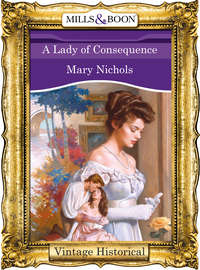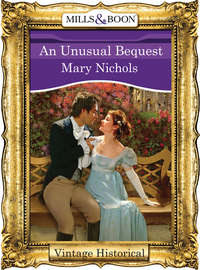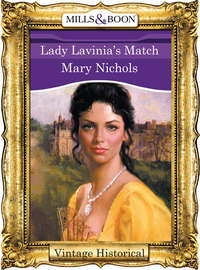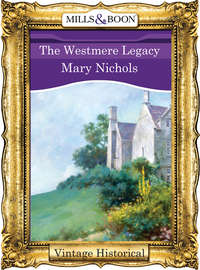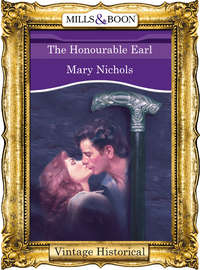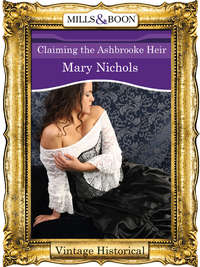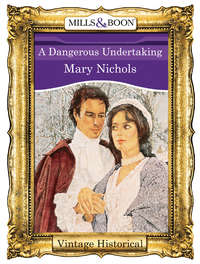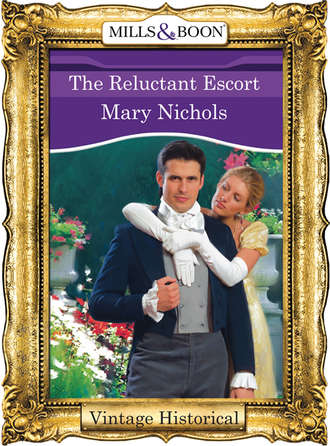
Полная версия
The Reluctant Escort
‘Perhaps Mrs Upjohn was not agreeable,’ she suggested.
‘Like all good wives, she will do as her husband bids her.’
‘I should not like her to come against her wishes, Captain, and I should hope Mr Upjohn would not insist.’
‘Then you would have to go back to Stacey Manor. I am determined we shall not continue alone.’
‘I know what it is,’ she said, speaking in a whisper, so that others in the crowded room would not hear her. ‘You are afraid you will be forced into making an honest woman of me. That is not at all flattering.’
‘And you are not at all consistent,’ he said, also keeping his voice low. ‘Yesterday you told me I am too old and you would not consider such a match. Now you seem to be saying the opposite…’
‘No, I am not. I simply said you were afraid you might have to. Let me set your mind at rest, Captain. I have no wish to marry you, but, having come this far, it would be foolish to turn back, especially as we are like to run into more trouble going back than going forward.’
‘How so?’ he queried, wondering what she understood by the term marriage. She could have no conception of physical desire, the love and passion that, in his view, should exist between husband and wife. The novels she read and her mama’s conversation had filled her head with nonsense. The man who married her would have a pleasurable time educating her.
‘Why, Mr Upjohn may very well have been taken up; had you thought of that?’
‘Yes, I had,’ he said irritably. He was beginning to wish he had not drawn Frank into this escapade, though it had seemed like a good idea at the time.
They had shared so much during the Peninsular campaign, both the comradeship and the danger, but Frank had had enough of war by the time Napoleon surrendered in 1814, and decided to return home to his wife. He had not taken part in the Battle of Waterloo. Duncan had come back to England in late 1815, after recovering in a Brussels hospital from a wound in his side received at Waterloo, but he could not bear the thought of going home and so he had reported to the War Office, hoping to be given active service. Instead he had been sent to track down a traitor. His enquiries had taken him to Norfolk and it was in Norwich he had met Frank again.
He smiled, remembering the night of revelry they had enjoyed as they’d reminisced and talked about old battles and the people they had known. But it had been obvious Frank was in a bad way. He was thin as a rake and his clothes were in tatters. He had admitted he could not find work and had turned to crime. Duncan had been appalled and infuriated. There was something wrong when a good and valiant man like Frank should be so little thought of by the country for which he had given years of his life, while men like Sir John Partridge prospered. He had asked him to join him.
‘There won’t be regular pay,’ he had warned. ‘But there will be something at the end of it, if we are successful.’
And so they had joined forces. Becoming a highwayman and living the life of a ne’er-do-well had been one way of dealing with a personal situation he found difficult to come to terms with and he justified it with the argument that he was obeying orders. Taking risks was a way of finding release. Until he met Molly.
She had made him see life with a different perspective, had forced him to examine his motives. And in spite of her conviction that he was a criminal, which was only half true, she trusted him. Did he deserve that trust? Did he deserve anyone’s trust? Martha’s? Or Frank’s?
‘Do not look so cross.’ Molly’s voice broke into his self-analysis. ‘It is not my fault you were seen holding up that coach. Indeed I have done my best to help you.’
He was about to tell her that she was more hindrance than help and that if she had not told the constable they were married he could have sent her back to Stacey Manor and forgotten all about her, but changed his mind. Not only would it hurt her feelings, it was palpably untrue. He could no more have sent her on alone than fly. Besides, he and Frank had brought their troubles upon themselves.
She smiled suddenly. ‘Mr Upjohn might be here soon and I am hungry, so do you think we could have something to eat while we wait? I am starving.’
In the face of her imperturbability, he could do no more than take her into the dining room and order a meal, in the hope that Frank would arrive before they had finished it.
Molly hated long silences, and though she tried very hard not to speak she could not resist trying to bring him out of his ill humour. But he would have none of it and she turned her attention to the conversation going on at the next table, which was occupied by four men—tradesmen or perhaps farmers, judging by their plain trousers and gaiters, frieze coats and shallow hats.
‘He says he gives them homes and educates them which is more than they had where they came from.’
‘Don’t make no odds,’ another said. ‘It’s trading in human beings and I don’t hold with that.’
‘But they ain’t exac’ ly human, are they?’ queried a third. ‘They’re savages. Black savages.’
‘That’s on account of they don’t know no better.’
‘Well, ain’t that just what I’ve been saying?’ the first man put in. ‘He educates ’em in the scriptures and teaches ’em to work in the house.’
‘Only so’s he can get more money for ’em. Why, I heard he makes ten thousand a year.’
‘You seem to know a lot about it.’
‘My brother-in-law was on one of his vessels. In the navy in the war, he was, but had to come out at the end of it. Surplus to requirements, he was, even though he was in ten years and didn’t know nothin’ else. Grunston offered him a berth and he took it, but when he comes back the tales he told fair made me shiver, I can tell you. He didn’t go only the once, said he’d rather starve than serve on a slaver again.’
By the time they had finished their meal, she had discovered that Mr Grunston owned two ships going out from Lynn to buy his human cargo, some of whom he sent on to the Indies, and the ships returned with cargoes of sugar from the plantations there—a double profit. Others he brought home and, having cleaned them up and taught them how to behave, he sold to Society ladies for whom having a black page or footman was the height of fashion. Two days hence he was off to London to purchase another decommissioned ship from the Admiralty to enlarge his fleet.
Molly leaned forward in order to whisper, ‘Captain, did you hear that?’
‘Hear what?’
‘Those men at the next table. They are talking about a slave trader earning ten thousand a year. Don’t you think that is disgraceful?’
‘It is not unlawful…yet.’
‘Well, I think it is reprehensible. I am persuaded the Dark Knight would have something to say on the matter.’
‘The Dark Knight?’ His only concession to being even slightly disconcerted was to raise one dark eyebrow quizzically. ‘Is he another of your fictional heroes?’
‘Oh, no, he is a real person, as you very well know.’
‘Do I?’
‘Oh, yes. I believe he models himself on Robin of Locksley.’
‘Who is Robin of Locksley?’
‘He is a mythical figure I read about. He lived a long time ago, in the time of Richard the Lionheart, and he was always holding travellers up and giving their gold to the poor.’
Duncan was diverted. ‘And what would this Dark Knight do, if he were here now?’
‘Hold the man up. Take his ill-gotten gains from him and set his slaves free.’
‘That would be a crime,’ he said drily.
‘But justified, don’t you think? You could distribute his wealth to deserving people and prevent another cargo of poor black men, women and children being sold into slavery.’
‘Me?’ he queried in astonishment.
‘Why not?’
‘Miss Martineau, I abhor the trade as much as anyone and I support those who advocate its abolition, but that is not the way to bring it about.’
‘Oh, I did not think you were so pudding-hearted.’
‘Molly, I wish you would put the Dark Knight from your mind. The Dark Knight is not Robin of Locksley, nor yet Don Quixote.’
‘Indeed he is not, if he will not tilt at a few windmills.’
He laughed in spite of himself. ‘Oh, you will be the death of me.’
‘Oh, no, but you must admit you would like to do it.’
‘Indeed I should,’ he said. ‘But that is not to say I will.’
‘No, perhaps it would not be wise without Mr Upjohn to help you.’ She liked to tease as much as he did and was gratified when he rose to the bait. ‘I think we should have waited at the Crosskeys and not come here without him.’
‘Do you? I recollect you wanted to go shopping.’
‘That was your idea. I did not ask to go.’
‘You could not go to London dressed in nothing but a filthy riding habit.’
‘No, but I was not in such haste that I would want you to abandon your friend.’
‘I have not abandoned him. He is well able to look after himself, which is more than can be said for you, who are young and vulnerable and whose head is filled with fantasy.’
‘My head is not filled with fantasy. You do not know me very well or you would know I am a very practical kind of person.’
‘Is that so?’ He smiled for the first time for over an hour. ‘I have seen no evidence of it so far.’
‘Then I will prove it. I shall come back with you. We may well meet them on the way.’
‘Not so long ago you were of the opinion we would run into greater trouble going back than going forward.’
‘I am sure you are clever enough to avoid anyone searching for you if you go carefully, and I am not afraid of a little adventure.’
‘No, that I had noted. And not above inciting a man to crime either.’
‘Oh, that,’ she said airily. ‘I was bamming. But you must allow that you are troubled about Mr Upjohn.’
He sighed heavily, admitting she was right. He was worried and his conscience was troubling him. Frank must be in trouble or else Martha was proving difficult. But if that were the case Frank would have come on without her.
If it were not for Molly he would not have hesitated, but if it were not for her he would not have been in this predicament in the first place. He was not at all sure he liked being so accountable for another human being, and one who was so artless. ‘Very well,’ he said. ‘We will go back, but only as far as the Crosskeys. He may be there.’
He rose from the table, leaving Molly to scramble under it in search of her shoes which she had kicked off.
‘Now what?’ he asked in exasperation.
‘Nothing. I am simply looking for my shoes. They were tight and…Oh, there they are.’ She bent to retrieve them and squeezed her white-stockinged feet back into them, to his unfeigned amusement. ‘It will be a relief to go back to my riding boots.’
She went up to their rooms to change while he gave orders for Molly’s new trunk to be kept for them when it arrived, and then they set off on horseback, retracing the route they had covered that morning, meeting a little traffic—a coach or two, several loaded haycarts, people on horseback and on foot—but not the curricle.
‘Where are we going now?’ she asked him when he’d returned from questioning the innkeeper at the Crosskeys and been told his friend had not returned there.
‘To his home. We’ll find out if he reached it.’
‘How far is that?’
‘An hour’s ride. Are you tired? Do you want to rest?’
‘No. I can keep up, never fear.’
They had been riding for perhaps an hour and were passing through a wooded area, when they came upon the curricle. It was tipped on its side in the ditch beside the road and there was evidence of a struggle, but of Frank or Martha there was no sign. Nor could they find the horse, though they stopped and searched the area.
Конец ознакомительного фрагмента.
Текст предоставлен ООО «ЛитРес».
Прочитайте эту книгу целиком, купив полную легальную версию на ЛитРес.
Безопасно оплатить книгу можно банковской картой Visa, MasterCard, Maestro, со счета мобильного телефона, с платежного терминала, в салоне МТС или Связной, через PayPal, WebMoney, Яндекс.Деньги, QIWI Кошелек, бонусными картами или другим удобным Вам способом.


